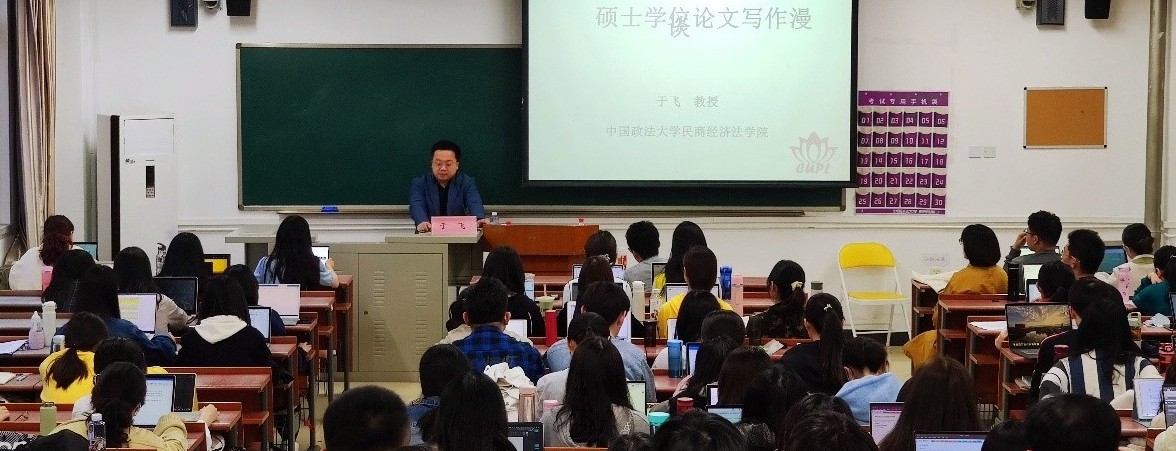On 21 April 2021, the China-EU School of Law (CESL) Lecture Series on“Supervising and Writing of Master's Thesis” was successfully held in Room 305 of the Mingfa Building, on the Changping Campus of CUPL. Professor YU Fei, Dean of Civil, Commercial and Economic Law School, CUPL, was invited to CESL to give a lecture on topic selection, organization structure, content development and other common problems arising while writing a thesis. Prof. YU made detailed analysis while putting forward relevant suggestions. The lecture was hosted by Professor LIU Fei, Chinese Co-Dean of CESL.

At the beginning of the lecture, Prof. LIU expressed a warm-hearted welcome to Prof. YU on behalf of CESL, then he stressed that significant importance should be attached to the master’s thesis by graduate students. The first-year students as well as the second-year students need to ensure ample time to research, and meanwhile communicate with their tutors actively. As far as the particularities of cultivating a good thesis is concerned, students need to have the awareness that topic selection should be considered while in the first year, and the thesis should be basically finished under the guidance of the tutor in the second year.
During the main part of the lecture, Prof. YU introduced matters needing attention from six aspects on master’s thesis writing. At first, Prof. YU claimed the importance of graduates to master research skills. He believes that the ability to research is a fundamentally useful quality and core competitiveness in a person’s legal career, and it is the ultimate exercise and embodiment of what exactly is the thesis. Next, Prof. YU talked about the main methods of legal research. He suggested that students need to practice literature review more often, master as many foreign languages as possible, and find the main academic context. Thirdly, Prof. YU explained distinctions between “Legislation theory” and “Interpretation theory”, discussed the necessity of “Interpretation theory” from three aspects——the demand of judicial practice, the practicality of law, and the objective requirements of Code, to help students orient themselves and point towards a direction in writing their theses, as well as remaining alert to avoid falling into the shackles of “legislation theory”.
Furthermore, Prof. YU addressed how to deal with the topic selection, introduction, structure and conclusion of a thesis. At first, several examples on failed topic selections were taken to alarm students to learn to find questions in cases analysis and comparison theories. Secondly, Prof. YU believed that the introduction of a master’s thesis is equal to the “proposal of questions” in a journal article, which should include research background, research meaning, research status and some other contents. Besides, it couldn’t be better to have the framework consisting of three to five parts, avoiding piling up materials. Finally, Prof. YU briefly introduced the difference between the conclusion and the abstract, as well as the role of the conclusion.

During the Q&A session, students asked about choice of writing style, methods of seeking issues, construction of knowledge systems, etc., and Prof. YU answered questions patiently and meticulously.
At the end of the lecture, Mr. ZHAO Tianshu made a concise and humorous comment, pointing out three “key words” of the lecture: Persuasion, Interpretation and Function. The lecture ended successfully with the applause of students.

Writing | SONG Yan, 2020 Double Master, CESL
Photo | ZHU Chenxu, 2020 Double Master, CESL
Translation | WENG Yan, 2020 Double Master, CESL
